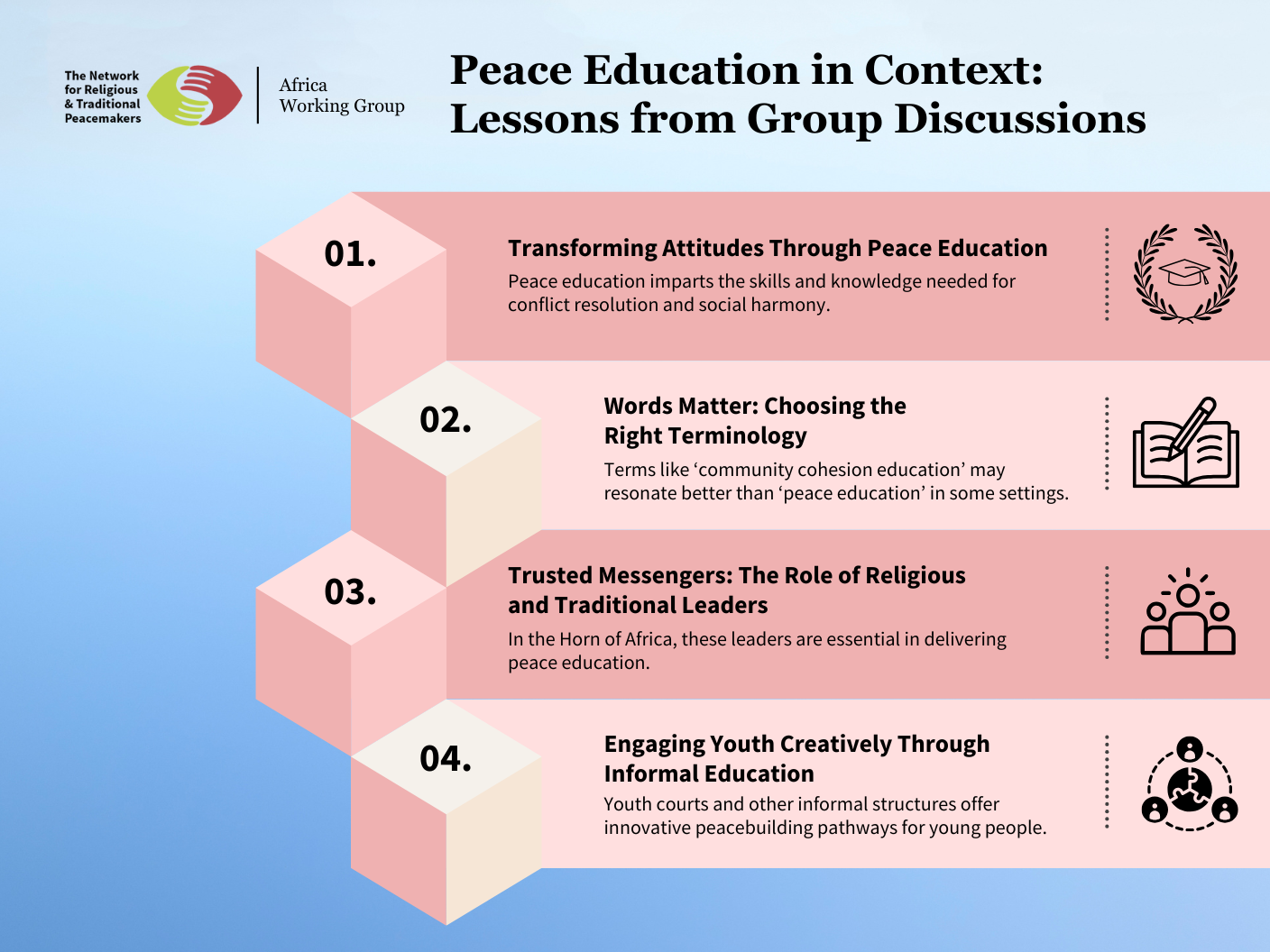Seeds of Peace: The Power of Peace Education in Africa
Africa Working Group | March 2025
Peace education is emerging as a vital tool for fostering stability and coexistence in regions affected by conflict. The recent Africa Working Group session, held on March 17, 2025, brought together 39 practitioners and experts to discuss strategies and experiences related to peace education. The session highlighted successful initiatives in South Sudan and Kenya, showcasing the transformative impact of peace education in diverse settings.
The Peace Education Manual: A Practical Guide
The session opened with an introduction to the Peace Education Manual, a collaborative effort by Teachers Without Borders, Finn Church Aid, and the Uganda Muslim Youth Development Forum. Presenters Riikka Pöyhönen and Salla Ruh outlined the key aspects of the manual, which offers structured lessons lasting 60 to 90 minutes. These lessons incorporate warm-up games, group-building exercises, and various creative activities such as drama and storytelling to instill peacebuilding values. Covering topics like communication, conflict resolution, and community participation, the manual also includes a project planning section that encourages students to design and implement peace initiatives in their own communities.
Education as a Tool for Stability in South Sudan
Hope Chichaya and Winnie Gulliver from Finn Church Aid (FCA) South Sudan shared insights from their work integrating peace education into technical and vocational training. Their program, aimed at stabilization and reconciliation, provides individuals with skills in tailoring, hairdressing, carpentry, and catering. Of the 182 participants, 93% completed their training, and 58% secured employment. Additionally, FCA South Sudan has introduced Peace Clubs in primary schools to promote peace at an early age. These clubs, coupled with training for community management committees, have significantly contributed to social cohesion and the reduction of violence.
Peace Education in Kakuma Refugee Camp, Kenya
Joseph Kyutha from Finn Church Aid Kenya provided an overview of peace education in Kakuma, a refugee camp housing 220,255 people, with 41% being school-aged children. Despite a teacher-to-learner ratio of 1:90 and 21% of children being out of school, peace education initiatives have made a notable impact. The program follows a four-stage framework:
1. Integration into the curriculum – embedding peace education in life skills lessons.
2. Extracurricular peace clubs – student-led groups promoting conflict resolution.
3. Leadership training – equipping students with problem-solving skills.
4. Project-driven peace initiatives – practical applications of peace education.
Positive outcomes include a reduction in school-based violence, improved student relationships, and enhanced leadership skills. However, challenges remain, such as resistance to new approaches, inadequate teacher training, lack of policy enforcement, and funding constraints.
Key Insights from Group Discussions
Participants engaged in group discussions to share insights from their respective regions. Several key themes emerged:
Challenges and Recommendations
While many successful peace education models exist, they are not widely published or adapted for different contexts. Additionally, access to training materials remains a challenge for many organizations. Therefore, enhancing the accessibility and adaptability of the peace education manuals would be recommendable. Participants emphasized that peace education should be integrated into national curricula and that religious teachings on peaceful coexistence should be leveraged to strengthen peace initiatives.
The Path Forward
To ensure the sustainability of peace education efforts, it was recommended to strengthen teacher and student engagement, expand peace club networks, and foster collaboration between communities and policymakers. Schools serve as crucial entry points for nurturing peace, and investing in education today will pave the way for a more harmonious future.
The Africa Working Group session reaffirmed that peace education is not just an academic exercise but a powerful mechanism for social transformation. By equipping individuals with the skills to mediate conflicts and foster unity, peace education sows the seeds for a more peaceful and inclusive society.
Follow the Peacemakers Network on social

